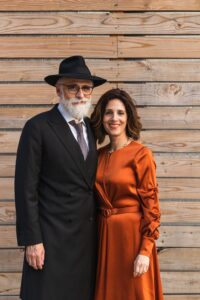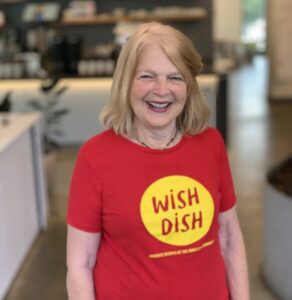
https://www.jpost.com/jerusalem-report/article-710843
By Matt Robinson
Having grown up in Melbourne as part of one of the founding Jewish families in Australia, and as part of an early Chabad mission to the land down under, Rabbi Ruvi New had “some pretty deep roots as far as the Jewish community goes.” Even so his early passions involved sports.
“That was the most primary reason we went to school,” he recalls, “to play sport״
Despite his strong Jewish background, it was not until one of his older brothers was married in New York that Rabbi New found the fire for Jewish leadership.
“That was the first opportunity I had to travel to NY and to meet the Rebbe,” he explains, recalling his meeting with Rabbi Menachem Schneerson (z”l), the revered head of the worldwide Chabad Lubavitch movement. “The opportunity to have that exposure to the Rebbe was pretty life-changing!”
While he observes that most 13-year-olds are not considering their live paths at that age, Rabbi New was profoundly impacted by the Rebbe’s vision to change the world and how much he believed in every person’s capacity to be a leader in changing the world for the better, one person and one community at a time. \
After graduating from the Rabbinical College of Australia and New Zealand in 1985, Rabbi New returned to New York to continue his studies and “be close to the Rebbe.”
In 1988, he was sent along with eleven other Rabbinical students to Caracas Venezuela for two years of study and communal outreach.
“That was an invaluable experience,” Rabbi new maintains. “Up until that point our studies had been focused our own academic growth. There it was more about outreach to the community.”
While in Venezuela, Rabbi New learned a great deal about himself and his life plan and also developed his public speaking and organizing skills, both of which have served him well in his own rabbinical career.
“Chabad does not really have a formal teaching program,” he observes. “It is very much on-the-job training, so this rabbi internship, if you will, gave you a lot of experience.”
Returning to New York, Rabbi New received ordination in 1990 and then engaged in even further study at the Kolel in Brooklyn.
As he had spent all of his life until that point in metropolitan areas like Melbourne, New York, and Caracas, Rabbi New’s first rabbinic post in suburban Marietta GA, was a bit of a culture shock. New stayed in GA, where his brother Rabbi Yossi New serves as the head Chabad Shliach to the Peach State for nearly seven years and then moved next door to FL, where he started the Jewish Learning Center in Miami Beach before moving again to Boca Raton. Again, familial ties helped Rabbi New make these latest transitions.
“I have a cousin – Rabbi Moishe Denburg who was one of the founding Rabbi’s of Chabad in Boca 30-someting years ago,” Rabbi New explains, noting that while the original branches are “increasingly vibrant” the growing Jewish population in the region has called for a total of five Chabad houses!
“I am on the coastal side,” Rabbi New explains, “which is a different demographic area.”
Speaking of different demographics, Rabbi New credits his Australian upbringing with preparing him to support a wide range of people.
“One of the advantages of growing up in Melbourne was the diversity of the community,” he observes, noting the presence of many Holocaust survivors and also a population of younger Jews who were strongly affiliated with their faith. “I think it engendered an appreciation for different people and how everyone contributes to this beautiful mosaic that makes up the Jewish people.”
While Boca may be known for its Jewish community, Rabbi New says that, when he arrived, his part of town was not evidently Jewish.
“It was very underdeveloped,” he maintains. “It was the place where people went to get away from or even to hide from the Jewish community.”
In fact, one of the most profound memories Rabbi New has of his latest (and longest) community post is of one of these “hiding” Jews.
“During one of the first years we were here,” he recalls, “there was a hurricane that was supposed to hit the day of Yom Kippur.”
Though many shuls closed, Chabad remained open and members combed the neighborhood looking for other Jews to invite to observe the Days of Awe, even as Hashem was demonstrating his awesome might.
“One of our members…found someone who was home and she tried to explain that it was Yom Kippur,” Rabbi New says of a man who turned out to be a Holocaust survivor. “He said, ‘You do not have to tell me what it was,’ and also asked her not to not tell me he was there.”
However, Rabbi New says, this might have been the man’s biggest mistake.
“The last thing you want to tell a Chabbad rabbi is ‘Don’t bother me!’ “he suggests.
Realizing that he might not be able to coax the man out alone, Rabbi New took his wife and children (who he calls”the heavy artillery”) to appeal to him once more.
“When he heard it was the rabbi’s wife at the door, he was yelling that he did not want to talk to us,” Rabbi New remembers.
When Rabbi New and his wife invited the man and his wife to their sukkah, however, the man’s wife replied in a thick German accent, “Ven do you vant him there?”
At the Sukkot table, the News led songs and l’chaims, but the man did not participate much.
“At some point ,” Rabbi new says, “he turns to me and say in a loud voice, ‘I HATE YOU!’”
When Rabbi New asked the man why he felt this way, he replied, “I hate to because you are forcing me to remember everything I have been trying to forget for the past 50 years.”
After what Rabbi New cites as a “stunned silence,” the man continued, saying, “But I love you, because I have not heard these melodies in 50 years.”
In addition to learning a great deal about the trials of the camps from an inmate who had witnessed the murder of his family and many friends, Rabbi New also learned avital lesson about how to be a better rabbi and a more effective contributor to the community.
“When you ask how to make inroads in a community,” he suggests, “the answer is primarily through one-on-one engagement and a lot of that is around the Shabbat table [where] you can share Jewish life in an intimate home setting with your family. It creates an environment in which you can engage with people from a place of genuine love and care and connection…. That can be very appealing because everyone wants to feel loved and cared for and connected.”
